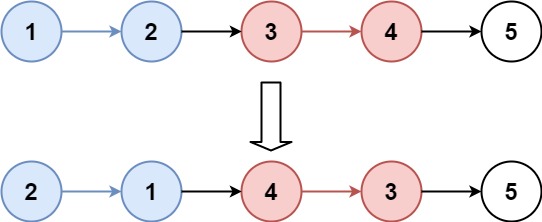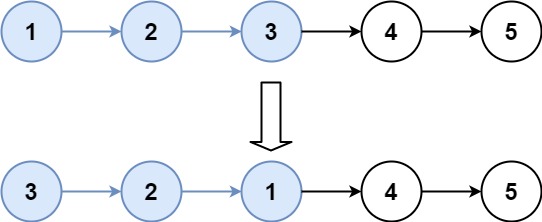Description
Given the head of a linked list, reverse the nodes of the list k at a time, and return the modified list.
k is a positive integer and is less than or equal to the length of the linked list. If the number of nodes is not a multiple of k then left-out nodes, in the end, should remain as it is.
You may not alter the values in the list’s nodes, only nodes themselves may be changed.
Example 1:

Input: head = [1,2,3,4,5], k = 2 Output: [2,1,4,3,5]
Example 2:

Input: head = [1,2,3,4,5], k = 3 Output: [3,2,1,4,5]
Constraints:
- The number of nodes in the list is
n. 1 <= k <= n <= 50000 <= Node.val <= 1000
Follow-up: Can you solve the problem in O(1) extra memory space?
Code
Time Complexity: , Space Complexity:
Recursive
/**
* Definition for singly-linked list.
* struct ListNode {
* int val;
* ListNode *next;
* ListNode() : val(0), next(nullptr) {}
* ListNode(int x) : val(x), next(nullptr) {}
* ListNode(int x, ListNode *next) : val(x), next(next) {}
* };
*/
class Solution {
public:
ListNode* reverseKGroup(ListNode* head, int k) {
ListNode* node = head;
for(int i = 0; i < k; i++) {
if(!node) return head;
node = node->next;
}
ListNode* new_head = reverse(head, node);
head->next = reverseKGroup(node, k);
return new_head;
}
ListNode* reverse(ListNode* first, ListNode* last) {
ListNode* prev = first;
while(first != last) {
ListNode* tmp = first->next;
first->next = prev;
prev = first;
first = tmp;
}
return prev;
}
};Iterative
/**
* Definition for singly-linked list.
* struct ListNode {
* int val;
* ListNode *next;
* ListNode() : val(0), next(nullptr) {}
* ListNode(int x) : val(x), next(nullptr) {}
* ListNode(int x, ListNode *next) : val(x), next(next) {}
* };
*/
class Solution {
public:
ListNode* reverse_list(ListNode* first) {
ListNode* prev = first;
while(first) {
ListNode* tmp = first->next;
first->next = prev;
prev = first;
first = tmp;
}
return prev;
}
ListNode* reverseKGroup(ListNode* head, int k) {
ListNode* dummy = new ListNode();
dummy->next = head;
ListNode* prev = dummy, *end, *nextHead;
while(head) {
end = head;
int i;
for(i = 0; i < k - 1 && end && end->next; end = end->next, i++);
nextHead = end->next;
if(i == k - 1) {
end->next = nullptr;
prev->next = reverse_list(head);
prev = head;
head->next = nextHead;
}
head = nextHead;
}
return dummy->next;
}
};